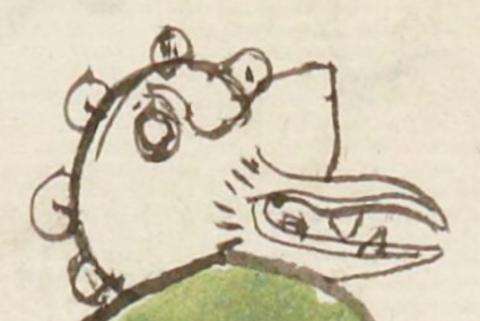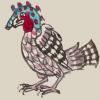Ehecatl (TR26r)
This element from a compound glyph (Ecatepec, see below) for the divine force (or deity) of the wind (Ehecatl) shows a bird-like head in profile facing toward the viewer's right. The bird's eye appears to be open. It has a large beak that includes teeth. Above the beak is a larger protrusion with a point, but also a somewhat flat line at the front. Hash marks appear at the base of the beak, which may be suggestive of movement. Along the perimeter of the head are five small circles, possibly round down feathers.
Stephanie Wood
The circles along the outline of the bird's head are reminiscent of the balls on the head of a turkey (totolin or huexolotl) or the down balls along the head of the Huitzilihuitl glyph (see below). Wind (or the divine force, deity known as Ehecatl) was a day sign in the calendar, and therefore became a name for many people. Here, however, it is a deity name that was part of a place name. Here, as in many cases, ecatl is used in the gloss when ehecatl may be intended. Perhaps ecatl can mean wind, too, and not just breath and air.
Gabrielle Vail and Christine Hernández (Re-Creating Primordial Time, 2013, ) describe Ehecatl as the wind aspect of Quetzalcoatl, and they note that Ehecatl "wears a buccal (duck) mask through which to blow wind." That the "beak" may have been perceived as a blowing device is supported by the glyph for Pitztli (below).
John Montgomery drew a group of wind glyphs (possibly mainly Mixtec), showing the variety of ways the blowing device might look. It is published in FAMSI, Inc.
Stephanie Wood
ca. 1550–1563
Jeff Haskett-Wood
wind, viento, deidades, deities, fuerzas divinas, divinidades, feathers, plumas, nombres de lugares

eheca(tl), wind, breeze, a deity, https://nahuatl.wired-humanities.org/content/ehecatl
eca(tl), air, breath, https://nahuatl.wired-humanities.org/content/ecatl
Telleriano-Remensis Codex, folio 26 recto, MS Mexicain 385, Gallica digital collection, https://gallica.bnf.fr/ark:/12148/btv1b8458267s/f77.item.zoom
The non-commercial reuse of images from the Bibliothèque nationale de France is free as long as the user is in compliance with the legislation in force and provides the citation: “Source gallica.bnf.fr / Bibliothèque nationale de France” or “Source gallica.bnf.fr / BnF.”








